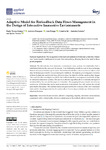Adaptive model for biofeedback data flows management in the design of interactive immersive environments

View/
Use this link to cite
http://hdl.handle.net/2183/28089
Except where otherwise noted, this item's license is described as Creative Commons Attribution 4.0 International License (CC-BY 4.0)
Collections
- Investigación (FCS) [1295]
Metadata
Show full item recordTitle
Adaptive model for biofeedback data flows management in the design of interactive immersive environmentsAuthor(s)
Date
2021-05-30Citation
Gomes, P.V.; Marques, A.; Donga, J.; Sá, C.; Correia, A.; Pereira, J. Adaptive model for biofeedback data flows management in the design of interactive immersive environments. Appl. Sci. 2021, 11, 5067. https://doi.org/10.3390/app11115067
Abstract
[Abstract] The interactivity of an immersive environment comes up from the relationship that is established between the user and the system. This relationship results in a set of data exchanges between human and technological actors. The real-time biofeedback devices allow to collect in real time the biodata generated by the user during the exhibition. The analysis, processing and conversion of these biodata into multimodal data allows to relate the stimuli with the emotions they trigger. This work describes an adaptive model for biofeedback data flows management used in the design of interactive immersive systems. The use of an affective algorithm allows to identify the types of emotions felt by the user and the respective intensities. The mapping between stimuli and emotions creates a set of biodata that can be used as elements of interaction that will readjust the stimuli generated by the system. The real-time interaction generated by the evolution of the user’s emotional state and the stimuli generated by the system allows him to adapt attitudes and behaviors to the situations he faces.
Keywords
Mental health and wellness
Affective computing
Empathy
Immersive environments
Augmented reality
Virtual reality
Electroencephalography
Biofeedback
Affective feedback
Affective computing
Empathy
Immersive environments
Augmented reality
Virtual reality
Electroencephalography
Biofeedback
Affective feedback
Editor version
Rights
Creative Commons Attribution 4.0 International License (CC-BY 4.0)
ISSN
2076-3417






